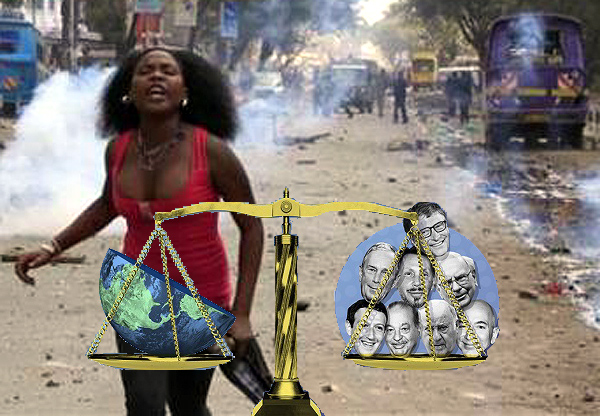 Each year at this time one news story is repeated, analyzed, attracts more comments and fuels more anger in Africa than any other single story of at any other time of the year, year after year:
Each year at this time one news story is repeated, analyzed, attracts more comments and fuels more anger in Africa than any other single story of at any other time of the year, year after year:
The rich gather at Davos and Oxfam releases its report on the inequality of wealth. Nothing comes close to getting the attention this does African-wide. And year after year it gets worse and worse:
In 2014 Oxfam claimed the richest 85 men in the world owned as much as the world’s poorest half. In 2016 that became 62. Last year it was 8.
“It’s Obscene,” headlined Kenya’s popular Mwakilishi online. Kenya’s Citizen TV claimed that the inequality “contributed to .. Britain’s decision to leave the European Union and Donald Trump’s presidential victory in the U.S.” then went on to broadcast an analysis that it is increasingly the poor who fund government, because as business consolidates and grows larger, it presents a “take-it or leave-it” policy to governments that extorts them into major tax breaks.
The popular “Nigerian Eye” pointed out those 8 wealthiest were all men, and that “resentment of elites has helped fuel an upsurge in populist politics.”
Another popular Nigerian online publication concluded, “public anger against this kind of inequality will continue to grow and lead to more seismic political changes.”
Amazon and Facebook are the primary contributors to these causes for inequality, according to South Africa’s biznews.com.
“When the inequality radar was brought closer to home,” reported South Africa’s DailyVoice, “just three billionaires in South Africa emerged as owners of the same wealth as the bottom 50 percent.”
Not fixing the problem, allowing it to fester leads to the type of nationalism and populism spreading all over the world.
In South Africa there is a growing movement against white people, because they are the wealthiest.
In “Dear White People,” an open letter published recently on News24’s blogpost, colored South African Peter Tracey asks, “Point me to any European country where Africans own the majority of land and natural resources – now tell me, do you [white South Africans] not have a debt to pay?”
White South Africans hold an unequal proportion of the country’s wealth for the same reason that rich elite in America do: unfair, even immoral government economic policies that have prevailed for years, even generations.
But calmer minds understand that no policy that targets a race will remedy anything, specifically because it doesn’t remedy the original cause.
Simply redistributing all the wealth at some point won’t prevent that wealth from being unequally divvied up at the next moment, unless the laws and social regulations that caused the problem in the first place are changed first.
Wealth cannot be static: it either grows or contracts. Simple redistribution may undermine the current capitalist models on which wealth increases, but without an alternative plan to grow wealth, wealth contracts and the exercise becomes self-defeating.
The cancerous growth of concentrated wealth inequality is indeed an economic disease, and none know this better than African entrepreneurs today, and African historians of yesterday. Now that symptoms of the disease in the First World are shaking the planet, who is going to take the lead to cure it?